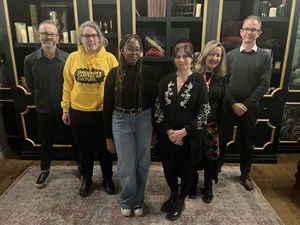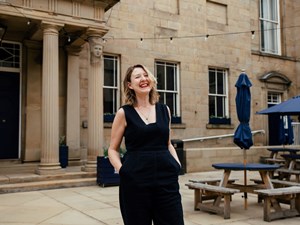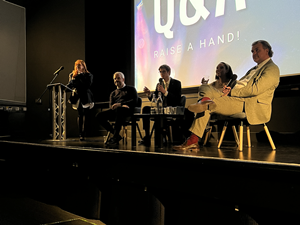Creative Network - Oliver Coppard
Oliver Coppard - South Yorkshire Major, sets out his vision and passion for the Cultural and Creative Industries in South Yorkshire.
Thanks for that introduction. It’s fantastic to be here in such brilliant company to talk about something that is close to my own heart, and so important for the future of our region.
Last September something very special happened in Sheffield – the star-studded premier of the glorious, ground-breaking, South Yorkshire-made film, ‘Everybody’s talking about Jamie’.
I remember just how exciting it was. How excited the city was.
Not just because of how good it looked. How funny it was. How real it was. Or how it told a story about us, our city and our region.
But because of what it meant for South Yorkshire.
It was a dazzling window into what Arts, Culture and Heritage mean for our region, and the potential they hold – for our economy, for our quality of life, for our image, for our sense of identity and pride.
That same month, the Combined Authority was one of the founding partners of the South Yorkshire Cultural and Creative Industries Network.
The network is part of the reason we’re here today.Everybody’s Talking About Jamie may have generated exceptional national and international attention, but it is only one particularly bright jewel in our cultural treasury.
From the Sheffield’s
Crucible Theatre to the Yorkshire Sculpture Park, from Conisbrough Castle in
Doncaster to Wentworth Woodhouse in Rotherham, from the music education
powerhouse of Sheffield University to Barnsley’s magnificent Youth Choir, we’re
home to absolutely world-class assets.
Alongside those assets sit a constellation of Festivals, big and small – from equine excitement at the St Leger at Doncaster Racecourse, to moon-bathing at Wenthworth’s Wonder Noir, to family-friendly music at Barnsley’s Underneath the Stars, and the brilliant awareness-raising of Sheffield’s Migration Matters.
We have a world-class cultural offer here in our region.
And we’re blessed with cultural and creative leaders that are taking us to the next level.
Here today – on the panel….
Clare Stewart from Doc Fest, one of the very best documentary film festivals in the world – taking place right now, right here in South Yorkshire.
Alex Deadman from Tramlines, one of the UK’s major music festivals, with acts this year from Madness to the always brilliant Everly Pregnant Brothers.
Sara Unwin from Off the Shelf, one of the UK’s premier literary festivals, now in its 30th year.
With the right people, the right partnerships and the right strategy we can start to punch our weight on a global stage.
But to do so we need the evidence.
From the data we’ve commissioned we’re discovering that culture and the creative industries are worth up to £2 billion in GVA to South Yorkshire.
Instead of the 13,500 people employed in the sector that the official stats say work here, that number is more like 31 and a half thousand. More than double.
That’s an army of micro-enterprises and freelancers that are going uncounted, and yet, every production, every gallery, every museum, every piece of public art, every museum and every cultural and creative product relies upon them.
Those same official statistics tell us that we have 2,900 cultural and creative businesses in the region.
The reality? We actually have more than 4,000.
And that number has been steadily growing over the past decade, including during the pandemic.
And this matters.
Every decision we make on where to invest in, what to invest in, and in who to invest is driven by evidence and data.
And if they’re wrong – then our decisions might just be too. So purely in economic terms, the bottom line is clear. The arts, culture and heritage are an important part of our economy, and they have a central role to play it helping it grow further.
But Arts, Culture and Heritage can also help us build a better as well as a bigger economy.
I know that there are too many jobs in this sector that are precarious and poorly paid. We’ve got work to do to resolve that.
But creative jobs and creative businesses are often highly skilled, hugely rewarding, and make an impact way beyond the narrow confines of the way we measure output.
They are also jobs that don’t break in the headwinds of global economic crises, more often they bend, sway and flex.
In an economy like ours that is more vulnerable than most to economic and social shocks, it is jobs and businesses like these that give us the resilience to come back stronger.
We should prize them much more highly.
And more than that – the whole sector has a value that goes entirely beyond its direct economic impacts.
Arts, culture and heritage help put our region on the map – nationally and even internationally. They change perceptions and communicate our identity. They make South Yorkshire a more attractive place not just to visit, but to live, work and invest.
They also change the way people feel – about themselves, about their communities, about places. We know they improve mental health, we know they bring vibrancy and confidence, we know they help inspire a wider culture of creativity and innovation.
That’s happening around the amazing Cast Theatre in Doncaster, it’s happening in Barnsley’s collection of museums, it’s happening in Rotherham with Grimm and Co, the Children’s Capital of Culture and it’s happening here in Sheffield too.
The arts and culture have both an intrinsic value, and personal impacts, that are sometimes hard to quantify, but very real – enriching lives, exposing people to new ideas and new worlds, giving them contact with the life-affirming beauty of creativity, and a chance to be creative themselves.
It’s about everything that makes us more than machines.
I’ve long argued that our vision for our region needs to go beyond the standard yardsticks of growth and employment – vital as they are.
We need a wider measure of progress, that includes sustainability, health, security, community, purpose, and wellbeing. Creativity and culture are part of that, an element of genuine quality of life.
You can in fact put a value to the wellbeing benefits they bring – our research puts it at around £1.2bn a year, with £10m a year in reduced NHS costs because of better mental health.
But for me this is also just a matter of common sense. The arts and culture are simply an integral part of what I think a good society looks like. So I believe Arts, Culture and Heritage are important. But what am I going to do about it you may ask?
Well, For all of you who are avid readers of political candidates manifesto’s, you can ignore the next section.
For those of you aren’t so diligent…..
I put Arts, Culture and Creative as a central plank of my manifesto. And I will see that through.
We’re going to work with the sector to co-design a new creative, cultural, and digital strategy for South Yorkshire.
We are going to establish a South Yorkshire Culture Forum, so that as we create policy we have a framework for a deeper exchange, rather than relying on one-off conversations like the one we’re having today.
I’m sure some of the people here today will have ideas on how we structure it and what we need on our agenda.
We’re exploring the creation of a Culture Pass to give young people, and possibly other groups that would otherwise be excluded, greater access to cultural activities and events. Because we’ve got to improve participation across the board.
All those things are important. But I also know that there is no substitute for funding.
Last year we set aside an unprecedented million pounds to support arts, culture and heritage as we came out of the pandemic.
I’ll seek to build on that. For a start, we’re in the process of preparing a £50m Create Growth fund bid. I’m going to go into the Department for Media, Culture and Sport, I’m going to go into the boardrooms of national cultural bodies, I’m going to take South Yorkshire’s story and South Yorkshire’s opportunity everywhere I go and I’m going to demand a fair settlement for our region.
Yes, we’ll make the case for more resources, but we’ll also make sure that we put our best foot forward locally. Hand on heart, we haven’t always spoken with one voice. We haven’t always thought big enough. We haven’t always made the best of our assets or our opportunity.
I intend to make sure that from here on in we do. We’ll do our very best – but of course there is no substitute for the government doing its job too.
I deeply regret that so called levelling up has largely proved to be a hollow façade in this sector, as in so many others.
Public funding in South Yorkshire is significantly lower than both national averages and in equivalent city regions – Arts Council England for example spends an average of £21 per head in London and just £9.20 in Yorkshire and the Humber. By some measures in South Yorkshire we’re losing out on up to £10 million every year.
That is just unacceptable. We need our creative and heritage industries to fulfil that great potential to lift up this region and many others. I will make the moral and practical case for that in Westminster.
And we should set our sights high. That’s why we’re laying the groundwork for our region to bid to become the UK’s first truly pan-regional UK City of Culture. What an incredible springboard that would give us to supercharge the whole sector. You know, I’m often struck by one thing. Nationally, the arts, culture and heritage are creeping up on the financial sector in size and importance – with the minor difference of course that they never crashed the economy.
But the financial sector gets more attention. It has a very loud voice. The creative industries don’t.
It they are to get the support they deserve, they need a champion on their side.
That’s the champion I hope to be. I believe our creative sector can and should be at the heart of the building a better, more prosperous, more creative South Yorkshire. I believe we should make that transformation an explicit strategic goal.
And with your help, I believe we can make it a reality.
Thank you.
Showroom Membership
Show us some love by joining our club >
Support Us
We welcome your support. Find out how you can help us >


